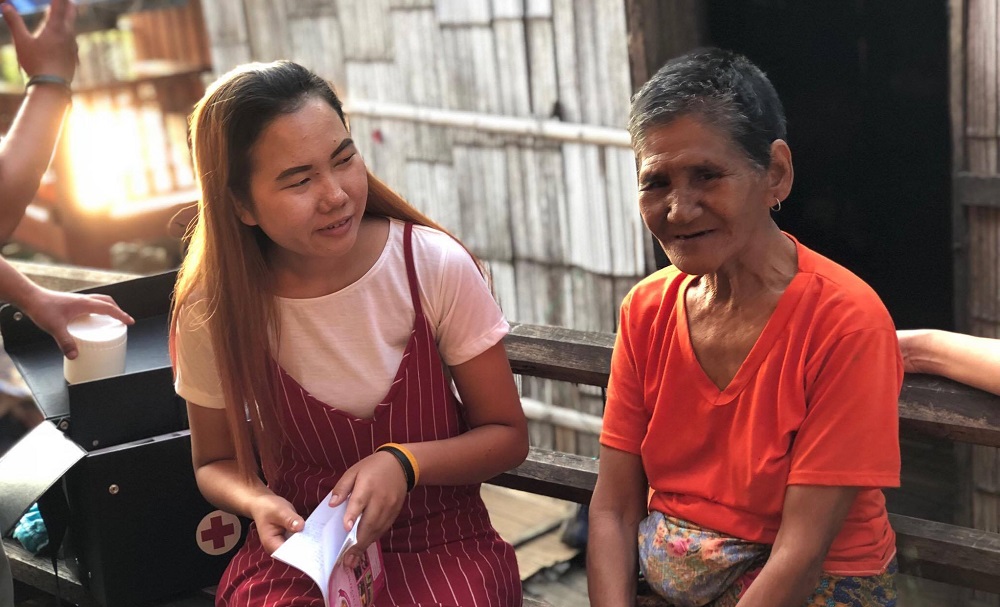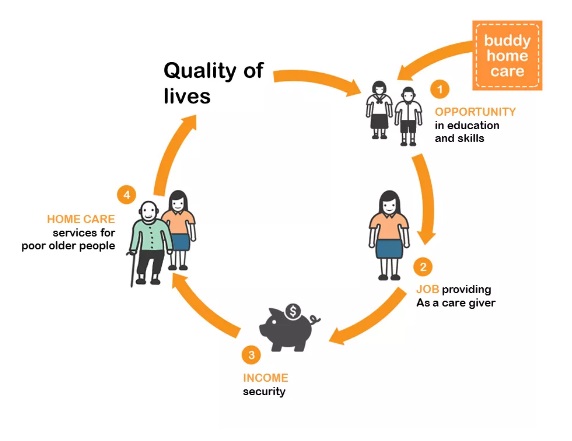
Thailand’s population is ageing quickly. This rapid demographic change presents a big challenge for the country, as more and more older people need care and support in their daily lives.
Throughout history, families have remained the bedrock of care and support in older age. As the typical family size shrinks, and the need for specialised knowledge and experience in care support becomes more apparent, many turn to private health services. For older people who can’t afford these services, this means they might not get the support they need.
Children living in poverty whose families can’t afford their education is another issue we face in Thailand. This can prevent young people accessing key opportunities and lead to lifelong struggles that deepen inequality in society.
Buddy HomeCare, a social enterprise operated by the Foundation for Older Persons’ Development (FOPDEV), provides a solution for this intergenerational challenge. In an interview with Janevit Wisojsongkram, the Deputy Executive Director at FOPDEV, we hear about the project and its benefits to both older and younger people.
How did the Buddy HomeCare project start?
Buddy HomeCare started 10 years ago. FOPDEV implemented a volunteer-based homecare programme for older people in Thailand under a multi-country project with HelpAge. Upon completion, FOPDEV sought other funding to continue providing community-based healthcare support for older people.
Sawang Kaewkantha, our Executive Director, foresaw that financial sustainability was crucial for the continuity of FOPDEV – it had to be more independent from traditional donor funding. So we came up with the idea of blending our social aims with profit-making principles, creating the Buddy HomeCare social enterprise.
The first step was to develop a business plan. The aim was to become a social business providing high-quality care services for wealthy older people and free services for older people who have a lower income. We joined a start-up incubation programme for social entrepreneurs and, in 2012, the project received a grant of US$1,650 from UnLtd Thailand to conduct market analysis. A year later, also with funding from UnLtd, we conducted a six-month pilot project training care workers. Later on, FOPDEV received more funding from the Thai Social Enterprise Office and the Thai Health Promotion Foundation to scale up the programme.
What is Buddy HomeCare’s aim?
Buddy HomeCare aims to create positive change in the lives of three target groups: older people with low incomes, older people with middle and high incomes, and youth with low incomes.
The project provides younger people living in poverty with training and jobs caring for older people. It also provides older people with cost-effective, high-quality homecare services, and develops a network of volunteer-based care services for older people who can’t afford them.

Buddy HomeCare has also collaborated with several relevant agencies in order to achieve our goals, including the Faculty of Nursing at Chiang Mai University, local authorities, sub-district hospitals, professional-health practitioners and healthcare volunteers in communities.
How does the project support older people in the community?
We bring staff and Buddy HomeCare trainees to communities to provide basic health check-ups, including blood-pressure and blood-glucose tests. They support older people in their daily-life activities, such as bathing, cutting their nails and hair, cleaning their house and by removing hazards in their environment to avoid accidents and injuries. These services are easily accessible and improve older people’s health. In cases where special care and close surveillance is needed, Buddy HomeCare staff communicate carefully with older people, their relatives and healthcare volunteers in the community so the relevant people are informed and can support the older person appropriately.
What are the key challenges in operating the social enterprise?
We have faced internal and external challenges. To run Buddy HomeCare, we had to shift our mindset, from thinking in terms of project-based operations with specific budgets and timeframes, to running a business that produces income, grows and needs to survive in the long run, while also having a social impact.
We needed a different set of skills, and this was a challenge for our staff who had always worked in the development sector and had no experience in the business sector. We had to build on learning and understanding the business concept. Another challenge was financial feasibility and sustainability. We strive to move our social enterprise forward, and to do so it needs to be self-reliant. This will hopefully mean the impact it has in society will also be sustainable.
What is your vision for the future?
We would like to expand our model to other potential areas. By 2020, we aim to open Buddy HomeCare branches in different locations, especially big cities where there’s a significant need for healthcare support and community-based homecare structures are already available, such as Bangkok, Lopburi and Khon Kaen.
We are investing in a mobile app application to facilitate the management and expansion of the model. This helps us re-position our brand to match the targeted customers and it should result in more clients and income. The app has features for health screenings, for designing individual healthcare programmes and for supporting follow-ups. We would like to license our innovation to relevant organisations, which would be another possible income channel.
We integrate “design-thinking” into our process, always reviewing and adapting the business model along the journey. This means it’s difficult to be specific about how the project will look like in the long term, but our vision is to support all Thai older people to access healthcare services that are suitable to their socioeconomic conditions so they can live with dignity.
Find out more about FOPDEV’s work.
